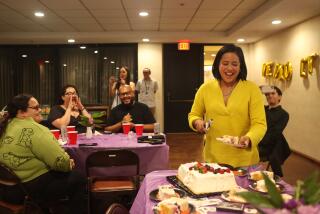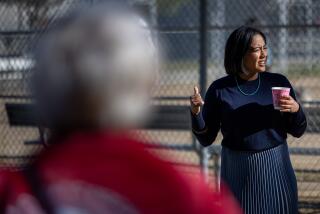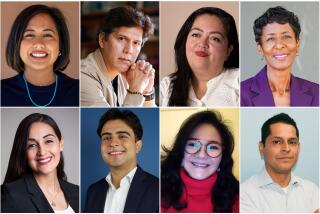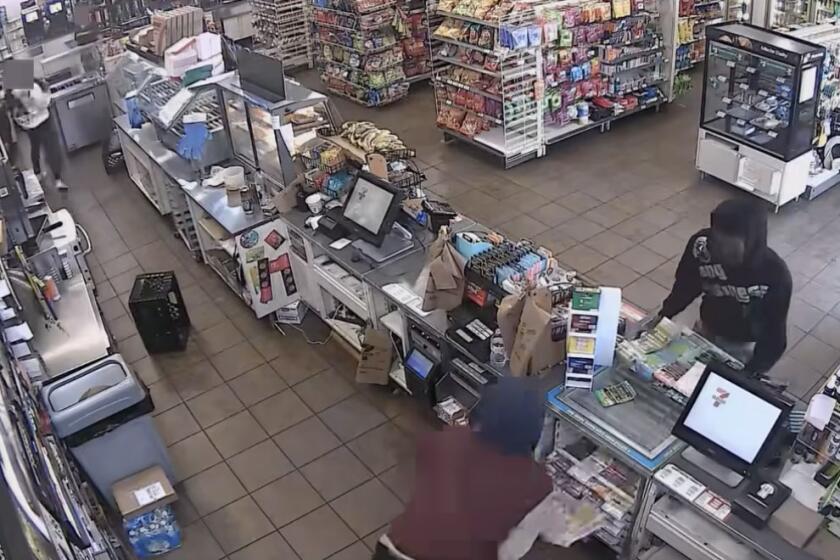David Alvarez a surprise contender to replace San Diego ex-mayor Filner
SAN DIEGO — At a busy corner in the Skyline neighborhood, City Councilman and mayoral candidate David Alvarez is looking with annoyance at a gravel-strewn lot surrounded by a wire fence.
Inside the fence is an abandoned gas station and tall weeds. The city bought the property a decade ago, promising a fire station. It was never built.
“This eyesore degrades not just property values but also community pride, and that should not happen anywhere in San Diego,” Alvarez told a small gathering.
He said that the council had just the day before added the site to a priority list for a fire station.
“We’re going in the right direction now,” Alvarez said in his characteristic low volume. “And as your mayor, I want to keep that happening.”
Amid a hurry-up election to find a replacement for the disgraced Bob Filner, Alvarez has emerged as the surprise of the season, gathering more support, endorsements and donations than many insiders expected.
He still lags behind the better-known front-runners, Councilman Kevin Faulconer and former Assemblyman Nathan Fletcher, but polls suggest he is gaining. A committee favoring Fletcher attacked Alvarez in a mailer as overly partisan and contributing to “dysfunction and gridlock” in city government.
At 33, he is the youngest of the major candidates, with only three years on the City Council. His message that neighborhoods have suffered in the last decade while the city struggled with financial problems is not unique. All the candidates say much the same.
But Alvarez has an advantage: He’s been saying the same thing on the council, often leaving him as the odd man out.
“We got to get him elected to do what we got to do,” supporter Kathleen Harmon said.
A Democrat and lifelong resident of San Diego, Alvarez represents a blue-collar district south of Interstate 8 that includes the neighborhoods of Barrio Logan, Golden Hill, Nestor, San Ysidro and the Tijuana River Valley.
More than just an east-west freeway, Interstate 8 is the traditional dividing line of San Diego politics.
When Filner, a Democrat, was elected last November, support from voters south of Interstate 8 was key. Citywide turnout was nearly 80%, driven by the presidential election.
But for the Nov. 19 special election, officials have predicted a turnout of 50%, maybe less, which will probably shift power back to more affluent neighborhoods in La Jolla, Rancho Bernardo, Point Loma and elsewhere where residents have a longer and more predictable history of voting.
Alvarez, elected to the council at age 29, says he is not intimidated.
“This election favors Republicans, so it will favor Kevin Faulconer,” he said. “But it also favors well-organized campaigns, and that’s me.”
Heavily funded by labor unions, Alvarez campaign signs are popping up throughout the city. He was the first candidate to begin television commercials.
His task is to gather votes from outside his district, from north of the freeway, while reinvigorating those who supported Filner.
Alvarez worked well with the bombastic ex-mayor but was among the first council members to urge him to resign amid allegations of sexual harassment.
“He’s got Filner’s ideology but without Filner’s arrogance, personality disorders and delusional view of the world around him,” said an endorsement editorial in the liberal weekly San Diego City Beat.
Acting Mayor Todd Gloria, a Democrat who has remained neutral in the mayor’s race, has words of caution: “I think people underestimate David at their own peril. He has done an excellent job at telling his story, which is very compelling. And I think his views match those of a lot of San Diegans.”
The son of immigrants, Alvarez was born in Barrio Logan, was briefly homeless during high school and graduated with a psychology degree from San Diego State. He worked as a teacher and then as a staff member for former state Sen. Denise Ducheny (D-San Diego).
On the council, Alvarez argued against focusing on downtown redevelopment to the detriment of neighborhood services. He felt “frozen out” by then-Mayor Jerry Sanders.
If Interstate 8 is the geographic dividing line of local politics, Sanders may be the ideological one. Faulconer’s TV commercials have Sanders endorsing him and promising that “Kevin’s plan begins in neighborhoods that have been neglected too long,” a campaign strategy that Alvarez mocks as “Save me, Jerry.”
Alvarez said Sanders was not “inclusive” as mayor, maintained a stranglehold on information and was too close to downtown business interests. When he left office, Sanders became president of the Chamber of Commerce.
Political consultant Christopher Crotty, who is not aligned with any candidate, regards Alvarez highly but thinks his criticism of Sanders may backfire. Even Filner was careful not to criticize Sanders.
“This line of attack plays well with David’s base Democratic voters,” Crotty said, “but will be harmful in persuading independent voters, much less Republicans, who think Sanders is the personification of what the perfect Republican mayor of San Diego should be.”
Alvarez has been endorsed by the county Democratic Party, the Sierra Club and Councilwoman Myrtle Cole, whose district includes Skyline.
Faulconer, the only Republican among major candidates, has the endorsement of the Chamber of Commerce and three Republican members of the City Council. Fletcher, an ex-Republican turned independent turned Democrat, has the backing of Gov. Jerry Brown, Atty. Gen. Kamala D. Harris, and the unions representing police officers and firefighters.
The fourth major candidate is Mike Aguirre, a Democrat, defeated for reelection as city attorney in 2008. He says that more must be done to control the spiraling cost of city pensions.
It may be on the issue of taxation that Alvarez differs most from Faulconer. Fletcher is more difficult to assess; his views on taxation appear to be evolving as he leaves his Republican past and embraces being a Democrat.
Alvarez supports raising the tax on developers to provide low-income housing; Faulconer opposes the idea. Alvarez supported Proposition D, the failed ballot measure in 2010 that would have boosted sales tax by half a cent to improve city services; Faulconer opposed the measure.
“I think it’s time for us to start growing this city in a way that is good for everybody,” said Alvarez, standing by the weedy lot. “And I think there are a lot of people north of Interstate 8 that feel the same way.”
More to Read
Start your day right
Sign up for Essential California for news, features and recommendations from the L.A. Times and beyond in your inbox six days a week.
You may occasionally receive promotional content from the Los Angeles Times.






